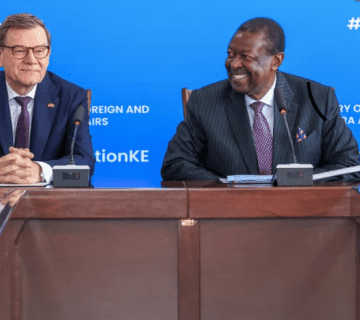Rwanda’s Minister of Foreign Affairs, Olivier Nduhungirehe, has confirmed that preliminary discussions are underway between Kigali and Washington regarding a potential agreement for Rwanda to host migrants deported from the United States. The talks, which remain in the early stages, come amid a renewed push by the administration of U.S. President Donald Trump to expand its deportation strategy by partnering with third-party nations.
Speaking in an interview with Rwanda TV, Minister Nduhungirehe stated, “It has not yet reached a stage where we can say exactly how things will proceed, but the talks are ongoing. Still in the early stages.” While details remain scarce, officials from both governments have confirmed that negotiations are underway, with Rwanda being considered as a primary destination alongside Libya and Ukraine.
The initiative gained further traction following recent remarks by U.S. Secretary of State Marco Rubio, who stated during a cabinet meeting that the administration is actively seeking international partners to accept deported individuals, especially those with criminal records who have completed their sentences. “We are working with other countries to say, ‘We want to send you some of the most despicable human beings to your countries,’” Rubio remarked, adding that destinations far removed from the U.S. border were preferable to prevent re-entry.
In exchange for accepting deportees, Rwanda would reportedly receive financial compensation. Additional support would include stipends and employment assistance for the migrants, aimed at encouraging social and economic integration into Rwandan society. While the framework remains conceptual, it suggests a transactional approach that reflects growing trends in global migration diplomacy.
This would not be Rwanda’s first encounter with a migrant-hosting agreement involving Western countries. In 2022, Rwanda signed a controversial agreement with the United Kingdom to receive asylum seekers removed from British territory. However, in November 2023, the UK Supreme Court ruled the policy unlawful, citing human rights concerns. The plan was officially abandoned in July 2024 by the newly elected Labour government, with Prime Minister Keir Starmer dismissing it as a “gimmick.” Rwanda is currently seeking £50 million ($66 million) in compensation over the collapsed deal.
Potential Benefits and Risks
For Rwanda, a prospective deal with the United States presents both opportunity and complexity. Strategically, it offers a chance to strengthen diplomatic ties with a global superpower. Financially, it could inject valuable resources into the national budget; resources that might be channelled toward infrastructure, employment programs, and social services. The agreement could project Rwanda as a cooperative and stable partner in international governance, especially in areas of migration and humanitarian responsibility.
However, the move is not without its challenges. Human rights organizations, most notably the United Nations High Commissioner for Refugees (UNHCR), have voiced serious concerns. They argue that deported migrants may face grave risks, including the possibility of being returned to their countries of origin, where they face persecution or violence. The UNHCR has warned that such arrangements could undermine international protection norms, an allegation Rwanda has strongly denied.
Domestically, absorbing foreign nationals with criminal records or complex legal backgrounds could place pressure on Rwanda’s social cohesion, legal system, and public services. Critics question the long-term viability of reintegrating individuals with limited ties to local communities, particularly in a nation still navigating its own post-genocide reconciliation and development journey.
For the United States, offshoring deportations represents a tactical response to a strained immigration system. It may alleviate detention overcrowding and allow the administration to project a tough-on-immigration stance ahead of the next electoral cycle. Nonetheless, the policy has sparked intense debate over its legal and moral implications, with many warning that it sets a dangerous precedent of outsourcing human rights obligations to developing countries.
Regional and Global Implications
The Rwanda-U.S. agreement could mark a turning point in Africa’s role within the global migration ecosystem. It risks institutionalizing a model of “outsourced migration management,” in which wealthier nations effectively transfer their immigration burdens to the Global South. Such an approach may attract other bilateral agreements with African countries, reshaping migration policy on the continent.
Yet this model also raises fundamental questions about sovereignty, justice, and the commodification of vulnerable populations. Critics caution that these arrangements risk using marginalized individuals as instruments of diplomatic convenience, potentially weakening the global framework for refugee protection. Tensions may further arise between host governments and humanitarian agencies, particularly if monitoring and reintegration mechanisms are weak or underfunded.
As discussions continue, both governments have yet to release official details or timelines. The coming months will be crucial in determining whether the proposed agreement materializes and on what terms. Regardless of the outcome, the discussions have already ignited broader debates about the ethics of migration diplomacy, the distribution of global responsibilities, and the shifting role of Africa in the international order.
Raissa Umunyana is a research intern at the Horn Institute
Photo Credits: The Guardian Jacquelyn Martin/AP


